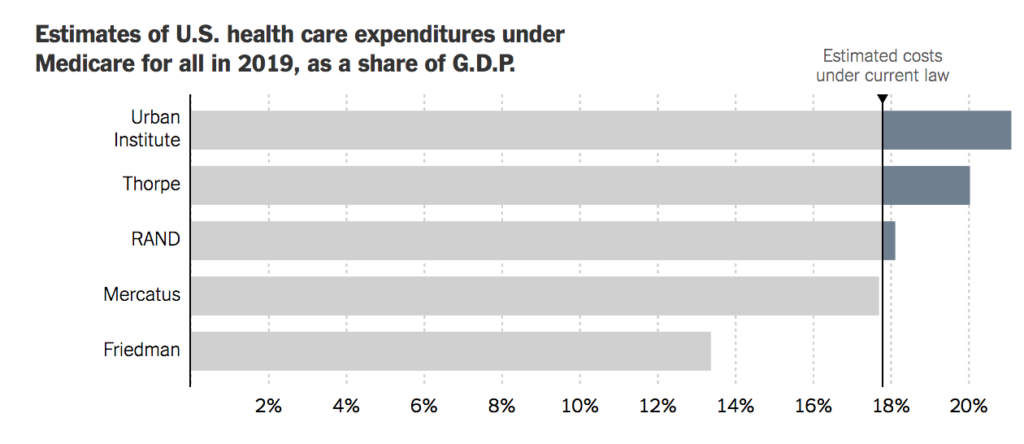This is the question the N.Y. Times posed to five experts in the field. Medicare for all could potentially save money. For instance, if the government could reduce administrative cost, cut prices paid to physicians and hospitals, or reduce drug costs. Typically, however, federal government programs rarely save cost and some of the reduction in the administration costs could include costs to reduce fraud and overuse of unnecessary services.
Given the magnitude of such a policy change, it should not be surprising that the experts varied greatly in terms of how much Medicare for all would cost.

Personally, I think the likely scenario will depend on how much appetite Americans have for rationing, longer wait times, and reduced choice. If Americans are willing to give up more choice and flexibility, cost savings may be large. If however, Americans want a health care system very similar to the current one, but paid for by the government, then overall spending on health care likely will grow.
The experts making these projections for the N.Y. Times included the following individuals/groups :
- Gerald Friedman, a professor of economics at the University of Massachusetts, Amherst, whose estimates were frequently cited by the Bernie Sanders presidential campaign in 2016.
- Charles Blahous, a senior research strategist at the Mercatus Center at George Mason University, and a former trustee of Medicare and Social Security.
- Analysts at the RAND Corporation, a global policy research group that has estimated the effects of several single-payer health care proposals.
- Kenneth E. Thorpe, the chairman of the health policy department at Emory University, who helped Vermont estimate the costs of a single-payer proposal there in 2006.
- Analysts at the Urban Institute, a Washington policy research group that frequently estimates the effects of health policy changes.
There are many more avenues for savings than those usually cited. Just eliminating government costs for the uninsured could save over $60 billion. By infusing more money into CMS administration (now a paltry amount except for the excessive costs of private plans in Part C and D) hundreds of billions could be saved from improved claims auditing. The expanded care under Medicare for All would also lower utilization of more expensive care (such as hospitalization), as has been seen with Medicaid expansion under the ACA. We have identified $1 trillion in savings. The only thing individuals will have to give up is out-of-pocket costs. We have done an analysis including these changes and found Medicare for All to be at least revenue neutral, even with additional investments in education, training, research and infrastructure.